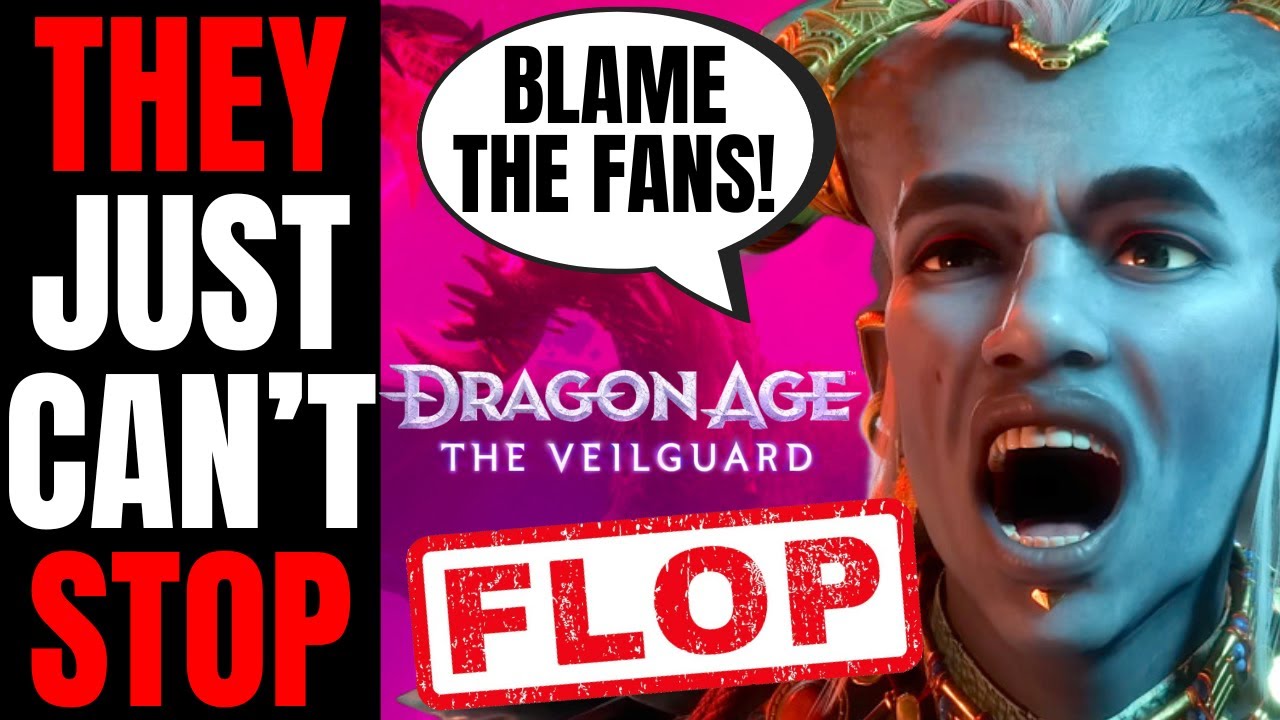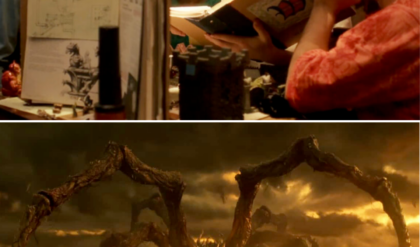Dragon Age: The Veilguard’s Fan Backlash and the Actress’s Bold Claim
The gaming world is reeling from a fiery controversy surrounding Dragon Age: The Veilguard, the long-awaited fourth installment in BioWare’s iconic RPG series, which has sold 1.5 million copies but fallen short of expectations, prompting a storm of criticism. At the heart of the drama is Alix Wilton Regan, a voice actress known for her role as the Inquisitor in Dragon Age: Inquisition and a supporting character in The Veilguard. Regan’s recent comments, claiming that fans “wanted BioWare to fail,” have ignited a fierce debate, with some accusing her of deflecting blame for the game’s lukewarm performance. As social media buzzes with outrage and BioWare faces layoffs and a pivot to Mass Effect 5, this saga reveals the fractured relationship between developers and fans, the weight of a decade-long wait, and the high stakes of reviving a beloved franchise.

The Spark of Controversy
Dragon Age: The Veilguard, released on October 31, 2024, after nearly a decade of development, was meant to be BioWare’s triumphant return to its RPG roots. Set in the fantasy world of Thedas, the game follows Rook, a customizable protagonist, as they battle to stop the elven god Solas from destroying the world. With a vibrant cast, including pansexual companions, and a shift to action-oriented combat, the game aimed to attract new players while honoring longtime fans. Despite earning a respectable 79/100 on OpenCritic and peaking at 70,000 concurrent players on Steam—EA’s best single-player launch on the platform—the game sold only 1.5 million units in its first quarter, missing EA’s 3 million target by nearly 50%.
Alix Wilton Regan, whose voice work has been a staple of the series, spoke out in May 2025, expressing heartbreak over the game’s reception. She argued that the backlash stemmed not from the game’s quality but from a vocal subset of fans who were “determined to see BioWare fail.” Her remarks, made in an interview, suggested that some critics judged the game prematurely based on its visuals or narrative tone, rather than engaging with its story or mechanics. The comments, while intended to defend the creative team, were met with swift backlash online, with fans on platforms like X accusing her of dismissing legitimate criticisms and alienating the series’ loyal base. Posts labeled her stance “tone-deaf,” with some sarcastically noting that blaming fans was “the new PR strategy” for troubled launches.
A Game Caught in the Crossfire
The Veilguard’s journey to release was anything but smooth. Initially conceived as a live-service multiplayer game, it was rebooted twice—first as a traditional single-player RPG, then refined to balance accessibility and depth. The final product, directed by John Epler, leaned into a lighter tone, vibrant aesthetics, and streamlined mechanics, departing from the darker, tactical roots of Dragon Age: Origins and Inquisition. While critics praised its polished combat and inclusive romance options, fans were divided. Some felt the writing lacked the nuance of past entries, with characters less fleshed out, while others struggled with a complex user interface that overwhelmed early playtesters. The absence of key returning characters like Alistair and Leliana, due to scrapped choice imports, further alienated veterans.
The game’s sales, while respectable for a niche RPG, fell short of EA’s lofty expectations, which assumed The Veilguard could rival blockbusters like Baldur’s Gate 3. EA CEO Andrew Wilson cited the lack of a “shared world” as a factor, doubling down on live-service models despite the series’ single-player legacy. The 1.5 million units sold outperformed flops like Anthem but paled against Inquisition’s 12 million lifetime sales, leading to perceptions of failure. BioWare’s subsequent restructuring—slashing staff to 100 and shifting focus to Mass Effect 5—left fans fearing the end of Dragon Age, with no DLC planned and the writing team, including Veilguard’s core scribes, no longer at the studio.
Regan’s Defense and the Fan Divide
Regan’s claim that fans wanted BioWare to fail tapped into a broader conversation about gaming fandoms, echoed by industry veterans like David Gaider and Mark Darrah. Gaider, a former Dragon Age lead writer, described “anti-fans” who latch onto perceived flaws—such as The Veilguard’s inclusive elements or action-heavy combat—and campaign against a game before release, celebrating its struggles as validation. Darrah, a BioWare producer, urged fans to show empathy, noting that development constraints, like EA’s shifting mandates, often shape outcomes beyond developers’ control. Both suggested that fandoms increasingly tie their identities to games, viewing changes as personal affronts.
For some fans, The Veilguard’s changes were a betrayal. The lighter tone, compared to Origins’ grim fantasy, felt like a dilution of the series’ soul, while the action-RPG shift drew unfavorable comparisons to God of War, especially after Baldur’s Gate 3 redefined expectations for deep RPGs. The game’s pansexual companions, while progressive, led to a ban in parts of the Middle East, further polarizing discourse. Critics on X called the game “a watered-down experience,” arguing that BioWare prioritized new audiences over loyalists. Yet, others defended The Veilguard, praising its accessibility and emotional moments, with one post noting, “It’s not Origins, but it’s a solid RPG that doesn’t deserve the hate.”
Regan’s comments, however, struck a nerve by appearing to dismiss these critiques. Her role as a series veteran lent weight to her words, but framing the backlash as malicious intent alienated fans who felt their concerns—about writing, tone, or mechanics—were valid. The backlash wasn’t universal; some supported her, arguing that toxic fandoms amplify negativity. Still, the narrative of “fans vs. developers” took hold, with memes and posts mocking her for “blaming the players” while BioWare’s layoffs fueled perceptions of a studio in crisis.
The Bigger Picture: Fandom and Failure
The Veilguard controversy reflects broader tensions in gaming culture. The rise of “anti-fan” behavior, as Gaider noted, sees communities weaponizing criticism to prove a point, often targeting studios like BioWare for perceived missteps, such as embracing inclusivity or chasing trends. This dynamic played out with Concord’s flop, where detractors celebrated its failure, but went silent when Assassin’s Creed Shadows succeeded. The Veilguard’s 1.5 million players, while below EA’s target, align with other RPGs like Final Fantasy 7 Rebirth, suggesting that EA’s expectations, not the game itself, were the issue. A decade-long development cycle, marked by reboots and a pivot from live-service, set an unrealistic bar for a series dormant since 2014.
BioWare’s history adds context. Once a titan with hits like Mass Effect and Dragon Age: Origins, the studio has struggled since Anthem’s 2019 disaster and Mass Effect: Andromeda’s lukewarm reception. The Veilguard was meant to restore faith, but EA’s focus on blockbusters left little room for a niche RPG to shine. The layoffs, which saw creative director John Epler reassigned to EA’s Skate project, and the entire writing team depart, have left fans mourning, with some declaring, “Dragon Age is dead.” Yet, former writer Sheryl Chee offered hope, stating that the series lives on in its fans through fanfiction, art, and community, even if BioWare’s focus shifts.
The Cultural Fallout
Regan’s remarks have become a flashpoint, amplifying debates about accountability in gaming. Fans argue that developers must respect their investment—Dragon Age fans waited a decade, after all—while creators like Regan, Gaider, and Darrah highlight the human toll of relentless criticism. The game’s ban in the Middle East over its pansexual characters added fuel, with some fans praising BioWare’s inclusivity and others decrying it as pandering. This polarization mirrors broader cultural divides, where games become battlegrounds for identity and values.
The Veilguard’s 1.5 million sales and strong Steam debut show it wasn’t a “massive flop,” but EA’s framing and BioWare’s restructuring have cemented that perception. Regan’s defense, while well-intentioned, misjudged the fandom’s passion, turning a nuanced debate into a blame game. Her voice work, lauded in Inquisition, remains a highlight, but her comments risk overshadowing her contribution, with fans on X joking that she’s “fighting the fandom single-handedly.”
The Road Ahead
BioWare’s pivot to Mass Effect 5 leaves Dragon Age’s future uncertain. EA’s insistence on live-service elements, despite fan resistance, suggests a disconnect that could haunt the studio. Fans, meanwhile, are rallying around Chee’s call to keep Thedas alive through creative works, with vibrant communities on Reddit and Bluesky sharing stories and art. Regan, for her part, is unlikely to retract her stance, but her comments may fade as the industry moves on. The Veilguard team’s departure—writers, designers, and all—marks a bittersweet end, but the game’s 79/100 score and loyal defenders prove it resonated with some.
For now, The Veilguard stands as a cautionary tale: a good game undone by unrealistic goals and a fractured fandom. Regan’s claim that fans wanted BioWare to fail captures a kernel of truth about toxic criticism but overlooks the love that kept Dragon Age alive for a decade. As the dust settles, the saga of Rook, Solas, and Thedas endures in the hearts of players, even if BioWare’s next chapter lies elsewhere. Dive into the drama, weigh the passion and the pain, and see why this RPG clash has everyone buzzing.





